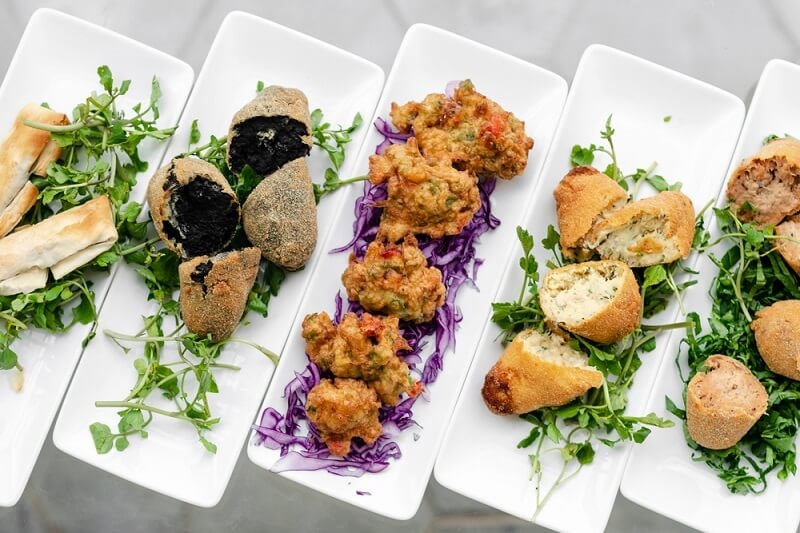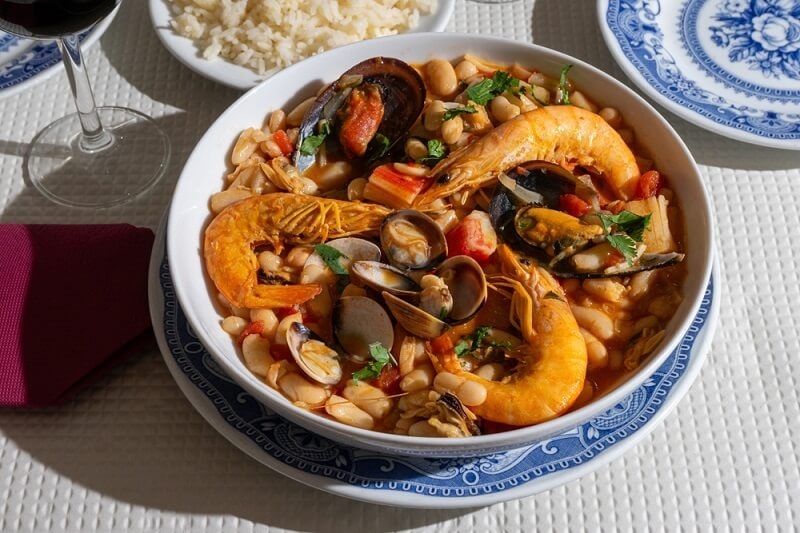
Portugal's culinary tradition is a mixture of flavors influenced by the sea, land, and years of tradition. Portugal's seafood cuisine, traditional Portuguese recipes, and seaside specialties showcase a culture that has influenced its geographic and cultural environment. Whether sampling meals in coastal towns of Portugal or the fine dining experiences, every bite contains Portugal's food heritage and the hospitality of the Portuguese people. With the help of an Algarve food guide, travelers can discover some of the region's specialties and learn about Portugal's cultural and culinary world.
Portugal's cuisine is meant to be uncomplicated yet flavorful. The basis of several meals is the abundant use of olive oil, garlic, onions, fresh herbs, and fresh seafood. One will frequently find sardines, codfish (bacalhau), mollusks, and shellfish along the coast. Portugal's traditional food links a rustic approach to many meals with local regional ingredients, resulting in hearty meals and shapes that speak closely to the land and its people.
Portugal's regional coastal dishes are made fresh on the spot and boast grilled fish, various stews, and rice dishes, with an oceanic focus.
Similarly, Portugal's food heritage strives to keep recipes and traditions from generations of everyday home cooks alive. The grand tradition of Portuguese cultural dining takes place mainly in Lisbon, Porto, Almada, and the Algarve region, but ensures that sharing meals from the same seated table is more than just food.
Seafood characterizes much of Portugal's cuisine. With a long, extensive Atlantic coastline, there is a steady supply of fresh catch. Grilled sardines are an iconic Portuguese seafood dish, especially for the summer festivals. Clams, mussels, and octopus are also center stage on many regional menus.
Bacalhau, or salted cod, is said to have over 365 recipes, one for each day of the year. Each recipe showcases the versatility of traditional Portuguese food, respecting the maritime history that determined the country. Dishes are significant cultural phenomena. For example, in the coastal regions of Portugal, especially in the popular holiday areas, arroz de marisco (seafood rice) brings together seafood with rice, making for a deliciously warm and hearty specialty.
Wherever you find Portugal's food heritage, you will also find that seafood dishes do not only represent a meal experience but also a ritual of portion control, with the crown of honor placed on them with local wines and shared with family or friends.
Traditional Portuguese food is rustic and home-style. Most meat dishes, like cozido à portuguesa, a slow-cooked dish with meats and vegetables, show resourcefulness and creativity. Caldo verde, a green soup of potatoes, kale, and chorizo, is also a traditional comfort food.
In each town, traditional recipes change slightly to maintain the local flavor, keeping authentic Portuguese cultural dining alive. Festivals and markets showcase Portugal's food heritage and give the younger generations an avenue to stay connected with their ancestral cooking.
From heavy stews to lighter baked goods and pastries such as pastéis de nata, traditional Portuguese food reminds us how food is connected to memory, family, and identity.

The Atlantic Ocean impacts Portugal's coastal cuisine, and specialty seafood is a highlight of the day. Local fishermen bring fresh seafood daily to be turned into grilled fish, fish and seafood rice, or cataplana rice (clamshell pot). The Algarve is interesting because it merges seafood with Moroccan or Mediterranean flavors.
Coastal towns in Portugal serve such dishes (outdoor seating areas) with the market or harbor in clear view, delivering a good, authentic meal at a coastal price.
When travel guides recommend the Algarve, most people recommend octopus salad, monkfish stew, or a seafood platter as marks of Portuguese seafood cuisine.
Portugal's coastal dishes balance freshness, simplicity, and seasoning to create delicately constructed dishes. They represent a type of food that recognizes the ingredients while showcasing their natural flavor.
Portugal's cultural dining goes beyond food—it is an experience. Mealtimes are social gatherings where families, friends, and even strangers share stories. Restaurants often emphasize hospitality, serving dishes that reflect Portugal's food heritage while creating connections.
Traditional tascas (small taverns) serve humble meals with wine, while fine dining establishments innovatively reinterpret Portugal's traditional food. Street festivals and seaside events highlight Portugal's coastal dishes, where grilled sardines and seafood rice are enjoyed outdoors in lively settings.
Portugal's cultural dining preserves history while embracing modernity, proving that food is both memory and evolution.
The Algarve region is a treasure trove for food lovers. An Algarve food guide often begins with seafood, but regional specialties extend further. Cataplana de marisco, a dish of mixed shellfish, is iconic. It is cooked in a sealed pot that preserves flavor.
Grilled fish, octopus, and even figs and almonds from local farms are essential to Algarve cuisine. Sweet treats like Dom Rodrigo and Morgado showcase Portugal's food heritage through regional desserts.
The Algarve food guide also introduces travelers to Portugal's cultural dining in seaside markets, where freshly caught fish is grilled on the spot. Exploring the Algarve's hidden towns reveals local eateries that prepare Portugal's traditional food with authenticity and pride.
Portugal's food heritage is greater than recipes—it's also about history, identity, and pride. It's about how, when we pass down cooking to future generations, we keep Portugal's traditional food alive. Heritage links us with our history, and regarding food, Portugal's heritage can be termed a rich legacy encapsulated in bread baked in stone ovens—flavors revealed by the dough coming into contact with clay pots—stews cooked in clay pots—a proverbial snapshot of history.
Portugal's seafood foodways exemplify this heritage, as coastal communities have relied on the ocean for centuries as their food source. The coastal recipes, and in particular, those for the foods from the Algarve, reveal diverse interactions between food and geography. Still, food and culture are reflected in many regional Portuguese foods.
Portugal's food heritage connects with celebrations, too. Portuguese Christmas dinners often include codfish. Easter feasts can consist of roasted lamb, and many regional or local festivals have developed to celebrate a special, unique dish. This continuity creates Portuguese foodways, a priceless cultural asset.
Wine is inseparable from Portuguese cuisine. The country’s diverse regions produce varieties that pair beautifully with local food. A crisp Vinho Verde enhances Portugal's seafood cuisine, while robust reds from the Douro region complement Portugal's traditional food, such as stews or roasted meats.
World-famous port wine represents Portugal's food heritage through centuries-old production methods. Enjoying wine alongside Portugal's coastal dishes adds richness to Portugal's cultural dining experiences, turning meals into celebrations.
Portuguese cuisine also has a passion for sweets. The pastéis de nata (custard tart) is probably the best-known and most recognized. In every Portuguese seaside town, you can find sweet pastries, many associated with a convent, and each seaside town has its own. The traditional sweet desserts in the Algarve region are predominantly maritime in nature, primarily almond, fig, and egg yolk-based, and influenced by the Arabs centuries ago.
Portugal's food heritage and culture mean desserts will always be part of special cultural occasions, whether a wedding or a religious feast. Traditional Portuguese cuisine might contain a lot of typical hearty and savory food, but desserts help balance the indulgent experience.
Portugal's seaside towns are often the best places to experience authentic Portuguese cuisine. In Nazaré, grilled fish reflects fishing traditions. Cascais offers Portugal's seafood cuisine with an elegant touch, while Lagos in the Algarve highlights Portugal's coastal dishes with rustic charm.
Each seaside destination reflects Portugal's cultural dining in unique ways. Local markets, waterfront taverns, and small family-run restaurants allow travelers to directly connect with Portugal's food heritage. The Algarve food guide often points to these towns as culinary highlights that are not to be missed.
Preserving Portuguese cuisine requires valuing both heritage and innovation. Chefs today experiment with traditional Portuguese food while keeping recipes rooted in authenticity. Families continue traditions by cooking at home, teaching younger generations the importance of Portugal's food heritage.
Portugal's seafood cuisine, coastal dishes, and regional specialties ensure diversity. Algarve food guide experiences allow visitors to witness firsthand how food connects people to place. Portugal's cultural dining, therefore, has become a living tradition celebrated daily across the country.
Portuguese cuisine is a journey through taste, heritage, and community. Every dish tells a story of land, sea, and culture, from Portuguese seafood cuisine to traditional Portuguese food and Algarve specialties. Portugal's cultural dining brings people together, while Portugal's food heritage preserves timeless recipes. Exploring Portuguese cuisine is truly experiencing the soul of the nation.
This content was created by AI